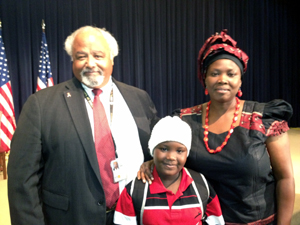 Tatu Msangi, a HIV-positive woman from Tanzania was still able to deliver a healthy HIV-negative baby. She named the baby FAITH. Thanks to the work of organizations such as the Elizabeth Glaser Pediatric AIDS Foundation (EGPAF), Msangi was taken onboard a preventive program called PMTCT (Prevention of Mother-to-child Transmission) sponsored by the foundation.
Tatu Msangi, a HIV-positive woman from Tanzania was still able to deliver a healthy HIV-negative baby. She named the baby FAITH. Thanks to the work of organizations such as the Elizabeth Glaser Pediatric AIDS Foundation (EGPAF), Msangi was taken onboard a preventive program called PMTCT (Prevention of Mother-to-child Transmission) sponsored by the foundation.
The EGPAF, a global leader in the fight against pediatric HIV/AIDS has reached more than 16 million women with services to prevent transmission of HIV to their babies. It currently works at more than 5,500 sites and in 15 countries to implement prevention, care, and treatment services; to further advance innovative research and to execute global advocacy activities that bring dramatic change to the lives of millions of women, children and their families worldwide.
One of the lucky women is Tatu Msangi, now EGPAF HIV-positive ambassador. Msangi is, today, ambassador of HOPE to millions of HIV-positive women.
Msangi, as US Secretary of State John Kerry said at a recent event to honor the US President’s Emergency Plan for AIDS Relief (PEPFAR) was a “living example of the impact and meaning” of the work institutions such as EGPAF was doing.
She is, today, tirelessly championing the cause and highlighting the plight of women living with HIV in her home country of Tanzania.
The impact of HIV infection is devastating. The disease has robbed children of their parents, some at a very early age of their life. Tanzania has fought the AIDS epidemic for 30 years, says Msangi in a piece she wrote recently.
“But in 2004, the challenges we faced seem insurmountable. Almost no one in Tanzania received the antiretroviral medications they needed to stay healthy. Between 1996 and 1999, the number of children who lost both parents to AIDs-related complications doubled. Though milions of people needed to be tested for HIV and receive counseling, there were only 527 testing and counseling sites in the entire country. But thankfully, KCMC (Kilimanjaro Christian Medical Center) – supported by the Elizabeth Glaser Pediatric AIDS Foundation (EGPAF) – had the resources needed,” Msangi wrote on her blog.
Speaking in an exclusive telephone interview from Washington with ANA’s Musah Ibrahim Musah in Berlin, Msangi, now 41, spoke about the challenges faced by HIV-positive women in Tanzania and her role as EGPAF’s HIV-positive ambassador.
She mentioned access to antenatal services to women in the early stages of their pregnancy. “Most of them,” she says, “come to the clinic late. They are not taken in early sometimes they come after several months into their pregnancy. So, it is late.
“But we are still educating them on early attendance at the antenatal clinic so that they can get the services in the early stages of their pregnancy. But, it is really also a challenge”.
Asked about the stigmatization often faced by HIV-positive women in Tanzania, Msangi said: “We are trying to educate them (women) at the clinic and to encourage them to form support groups of HIV-positive women. We are also working to get them as counselors to counsel other women to make them aware that they are not alone; that there are also other women who are HIV-positive like them. Also, to assure them that it is not a problem for one alone.”
On matters confidentiality among health workers and how to address the issue to attain public confidence in the privacy of HIV testing, the EGPAF ambassador agrees that the “problem of confidentiality” was crucial in Tanzania where she works at the Kilimanjaro Christian Medical Center (KCMC) as a nurse.
“Our clients are complaining now and then about the issue of confidentiality. But we are busily educating the health workers about the problem. Because if there is lack of confidentiality, our clients would not ‘walk-in’ and, sometimes they leave the nearby health facilities to go far away to attend a clinic. So, it is an issue that we are working to educate the counselors on confidentiality.
Asked about men’s attitude towards women infected with HIV, Msangi stressed that “one of the biggest challenges in the fight against HIV is male attitudes.”
She urged women, girlfriends, wives, and mothers to keep trying to encourage men to come to “their senses” and learn about HIV.
“Once a man gets involved with his partner in the PMTCT process, it makes a big difference—not just to that man but to the men around him. Men will listen to another HIV-positive man more than they will a woman. That’s our culture,” she adds.
Adult HIV prevalence (ages 15 – 19) in Tanzania, estimated at 5.6% in 2009 has declined slightly from 6.5% in 2005. HIV prevalence is much higher in urban (8.7%) than rural (4.7%) areas, and females are more likely to be HIV positive than males (6.8% vs. 4.7% respectively). Prevalence is higher among adults from the richest economic quintile as compared with the poorest economic quintile. Between 2009 and 2011, Tanzania has seen a 19% decline in new pediatric HIV infections – from 26,900 to 21,900. HIV prevalence among pregnant women was 5.5% in 2009.
Tanzania is scaling up its PMTCT program, mainly through integrating PMTCT services into MNCH services. By 2010, the majority (90.4%) of ANC facilities had integrated PMTCT services. HIV testing among pregnant women increased from 14% in 2005 to 86% in 2010[10], and 74% of pregnant women living with HIV received ARVs for PMTCT in 2011.
Tanzania has adopted WHO Option A regimen for prophylaxis and a costed national PMTCT scale-up plan (2011-2015) is in place. Given the high level of PMTCT service coverage in Tanzania, the country is well placed to achieve Global Plan targets by 2015.